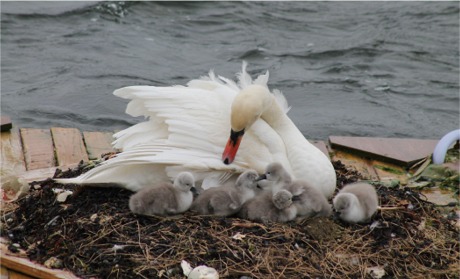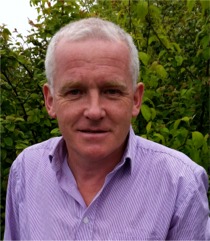|
|
Hope floats for Irish lovebirds
25.05.15
A PAIR of Irish swans
have mated successfully for the first time thanks to
a special man-made raft built to prevent their nest
washing away.
The mute swans, who have been together for eight
years, lost all their clutches of eggs to high tides
and flooding in Oranmore, Co Galway since 2007.
But against all the odds the 12-year old waterbirds
are now first-time parents to five fluffy cygnets
thanks to a team of volunteers led by mechanical
engineer Peter Butler, who built them a floating
love-nest.
The swans' nine eggs began hatching last Wednesday
with the little family of five cygnets born by
Friday - the day Ireland historically went to the
polls to vote Yes in the Marriage Equality
Referendum. |
 |
|
Mother swan watches over her five
cygnets which hatched last week. |
Swans famously mate for
life but the Oranmore lovebirds’ efforts were
thwarted year after year due to relentlessly high
tides at their favourite nesting spot - a small,
grassy island in Oranmore estuary.
Mr Butler, who works at Galway Mayo Institute of
Technology, said he had been saddened at the swans'
repeated and failed attempts to have a family. |
"I couldn't sit back
and watch these swans fail again this year. They
have repeatedly lost their nest and eggs to storms
and rising tides every year for about eight years,"
said Mr Butler.
"They would attempt to build on a small island which
was originally a mill race but it got totally
swamped by high tides so every single year their
nest would collapse and their eggs would get washed
away. I spotted the problem last year and decided
enough's enough."
Mr Butler, a life-long nature lover and
conservationist, did not want to unduly interfere
with the laws of nature. |
 |
|
Mechanical engineer Peter
Butler. |
Environmental and
planning regulations also had to be considered as
the swans' nesting area lies in a Special Area of
Conservation.
But with help and advice from his friends in Galway
Conservation Volunteers and Oranmore Development
Association, he set about building the raft in his
back yard.
Putting his engineering skills to good use, he
created the structure using €115 worth of recyclable
materials including four wooden pallets and
builders’ planks. The raft had to be light enough to
float but heavy enough to withstand strong currents
and high tides during the swans’ February to May
breeding season.
The birds’ favourite nesting materials including
seaweed, grass and branches were then placed on top
of the structure.
It was subsequently launched into the middle of the
estuary and moored into position to allow it to bob
and flow, pontoon-like, with the tide. After a
number of days, the cob (male swan) accepted it as
his own and breeding began.
The Bray-born engineer admits the project was not
without its detractors with some people describing
it as an "eyesore".
But his efforts were rewarded and he now hopes
Oranmore’s newest swan brood will thrive to grace
the town’s waterways long into the future.
“This was always a gamble and I am elated that it
has paid off,” he added. |
|

